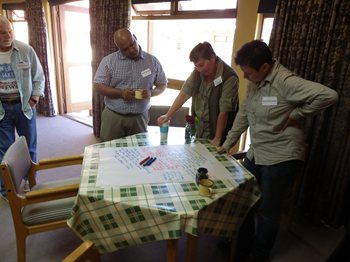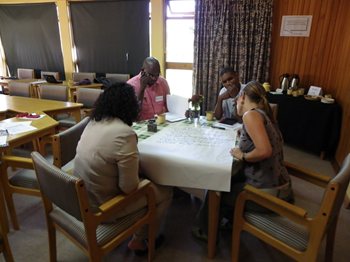 In a time of global environmental instability, public-sector organisations that manage and protect natural resources, which are needed for human wellbeing, play an increasingly important role. These organisations frequently have to weigh up the costs and benefits of managing natural resources and their services for the public good. Management of social-ecological systems is commonly characterised by uncertainty, disagreement and trade-offs. In South Africa, these challenges are compounded by the fact that mandated organisations are often inadequately resourced in terms of finances, skilled staff and infrastructure.
In a time of global environmental instability, public-sector organisations that manage and protect natural resources, which are needed for human wellbeing, play an increasingly important role. These organisations frequently have to weigh up the costs and benefits of managing natural resources and their services for the public good. Management of social-ecological systems is commonly characterised by uncertainty, disagreement and trade-offs. In South Africa, these challenges are compounded by the fact that mandated organisations are often inadequately resourced in terms of finances, skilled staff and infrastructure.
In order to maintain the resilience and robustness of social-ecological systems, public-sector organisations need to cultivate a set of dynamic capabilities, with strong emphasis on learning from their experiences and adapting their management strategies, to innovate and improve their performances. Absorptive capacity (AC) has been described as the ability of an organisation to recognise the value of new external information, acquire it and assimilate it within the organisation, transforming it by applying it with existing knowledge and exploiting the new knowledge for benefit. Organisations with good AC are able to recognise rapidly changing environments and address them by renewing and building on their levels of skill, knowledge and capability to deal with change.
This construct has been extensively researched in industries related to business and technology, where its development has been found to stimulate innovative capabilities. There has, however, been little research into its relevance for public-sector organisations or organisations with environmental mandates. This study used methodological triangulation to assess the attitudes of employees on the current state of AC in three public-sector organisations with environmental mandates. This was done to gain insight into their capacity to absorb information and apply their new knowledge in decision-making, in a manner that navigates through environmental change.
The key findings of this research suggest that knowledge transformation and exploitation are enhanced by in-house research capabilities and cross-functional interface between internal departments. These findings also suggest that the acquisition of knowledge is not only determined by the in-house research capacity but also depends on the resources available to these departments in terms of time, finances and skilled staff. There was minimal evidence of knowledge exploitation; however, obstacles that were highlighted as hindering this process included individual responsibility and motivation, as well as general organisation capacities, such as communication hierarchies, funding, time and organisational silos. This research found that the well-studied concept of AC can be used as an institutional mechanism to assess and promote adaptive capacity in public-sector organisations with environmental mandates to navigate and innovate through the Anthropocene.
 What did the SRU mean to me?
What did the SRU mean to me?
The SRU has been the metaphorical ‘nursery’ to my mind over these past few years. I came to the SRU as a seed and it has provided me with the environment to fertilise my mind and grow strong roots. It has been more than just a place where I worked on my research, it also exposed me to new knowledge, skills and practical experiences.
The SRU is not just a unit of researchers, but it is also a community of practice. The whole team work together, with external stakeholders, to find solutions to common and complex challenges that effect our immediate and global environment. Theses and dissertations do not stand alone, but form the pieces to a larger puzzle that works together to create a more sustainable future. Through the SRU I have meet and formed strong foundational relationships with people in my industry, and developed skills which I believe will be beneficial for years to come.
I could not have completed my studies without the continuous support of the SRU supervisors, post-doc’s and other fellow post-graduate students. All of these individuals have added value to my learning journey. I would recommend the SRU to anyone who wants more out of their post-graduate journey than a mere certificate at the end.
Highlights of my research journey:
All the experiences of group facilitation and dialogues. All the learning!